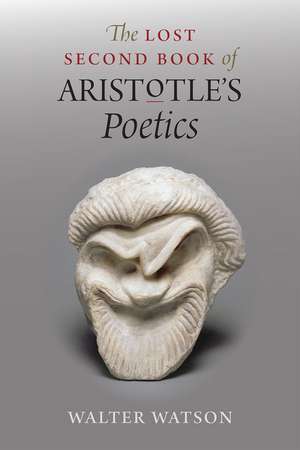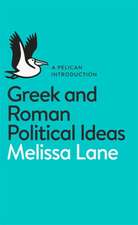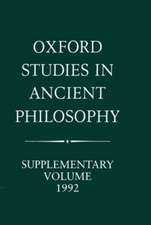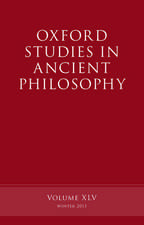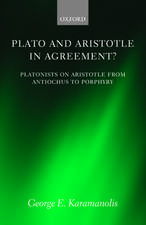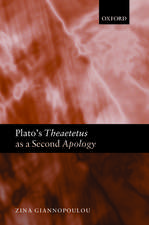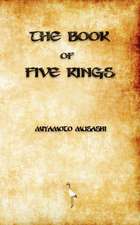The Lost Second Book of Aristotle's "Poetics"
Autor Walter Watsonen Limba Engleză Paperback – 19 mar 2015
Of all the writings on theory and aesthetics—ancient, medieval, or modern—the most important is indisputably Aristotle’s Poetics, the first philosophical treatise to propound a theory of literature. In the Poetics, Aristotle writes that he will speak of comedy—but there is no further mention of comedy. Aristotle writes also that he will address catharsis and an analysis of what is funny. But he does not actually address any of those ideas. The surviving Poetics is incomplete.
Until today. Here, Walter Watson offers a new interpretation of the lost second book of Aristotle's Poetics. Based on Richard Janko’s philological reconstruction of the epitome, a summary first recovered in 1839 and hotly contested thereafter, Watson mounts a compelling philosophical argument that places the statements of this summary of the Aristotelian text in their true context. Watson renders lucid and complete explanations of Aristotle’s ideas about catharsis, comedy, and a summary account of the different types of poetry, ideas that influenced not only Cicero’s theory of the ridiculous, but also Freud’s theory of jokes, humor, and the comic.
Finally, more than two millennia after it was first written, and after five hundred years of scrutiny, Aristotle’s Poetics is more complete than ever before. Here, at last, Aristotle’s lost second book is found again.
Until today. Here, Walter Watson offers a new interpretation of the lost second book of Aristotle's Poetics. Based on Richard Janko’s philological reconstruction of the epitome, a summary first recovered in 1839 and hotly contested thereafter, Watson mounts a compelling philosophical argument that places the statements of this summary of the Aristotelian text in their true context. Watson renders lucid and complete explanations of Aristotle’s ideas about catharsis, comedy, and a summary account of the different types of poetry, ideas that influenced not only Cicero’s theory of the ridiculous, but also Freud’s theory of jokes, humor, and the comic.
Finally, more than two millennia after it was first written, and after five hundred years of scrutiny, Aristotle’s Poetics is more complete than ever before. Here, at last, Aristotle’s lost second book is found again.
Preț: 255.94 lei
Nou
Puncte Express: 384
Preț estimativ în valută:
48.98€ • 50.53$ • 41.45£
48.98€ • 50.53$ • 41.45£
Carte tipărită la comandă
Livrare economică 04-18 martie
Preluare comenzi: 021 569.72.76
Specificații
ISBN-13: 9780226274119
ISBN-10: 022627411X
Pagini: 320
Ilustrații: black & white illustrations
Dimensiuni: 152 x 229 x 23 mm
Greutate: 0.47 kg
Editura: University of Chicago Press
Colecția University of Chicago Press
ISBN-10: 022627411X
Pagini: 320
Ilustrații: black & white illustrations
Dimensiuni: 152 x 229 x 23 mm
Greutate: 0.47 kg
Editura: University of Chicago Press
Colecția University of Chicago Press
Notă biografică
Walter Watson is professor emeritus of philosophy at Stony Brook University, State University of New York. His previous book was The Architectonics of Meaning: Foundations of the New Pluralism.
Cuprins
Acknowledgments
Introduction
1. The Lost Second Book of Aristotle’s Poetics
2. Aims of the Present Book
3. Method to Be Followed
4. Prospective Readers
Introduction
1. The Lost Second Book of Aristotle’s Poetics
2. Aims of the Present Book
3. Method to Be Followed
4. Prospective Readers
Part I. Groundwork
Chapter 1. Aristotle’s Arts and Sciences
1. The Organon
2. Preface to the Theoretical Sciences
3. Mathematics
4. The Physical Sciences
5. The Biological Sciences
6. First Philosophy
7. The Order of the Arts and Sciences
8. The Practical Sciences
9. The Productive Sciences: Poetics
10. Rhetoric
11. Scientific Rationality as a Guiding Idea
Chapter 2. Causes
Part II. The Symbolon Argument
Chapter 3. Causes in the Poetics
Chapter 4. Poetic Imitation
1. The Analysis of Poetic Imitation
2. The Scope of Poetic Imitation
3. The Evolution of Poetic Imitation
Chapter 5. Expectations of Poetics II
Chapter 6. The Epitome of Poetics II
Chapter 7. Comparison of the Epitome with Our Expectations
Part III. The Kinds of Poetry
Chapter 8. Imitative Poetry
1. The Autonomy of Imitative Poetry
2. The Autonomy of Aristotelian Disciplines
3. Autonomy of Art in the Aristotelian Tradition
Chapter 9. Historical, Educational, and Imitative Poetry
Chapter 10. Historical Poetry
1. Historical Poetry
2. Historical Poetry and History
3. Historical Poetry and Imitative Poetry
4. Historical Poetry and Rhetoric
Chapter 11. Educational Poetry
1. Poetry and Philosophy
2. Poetry and Education
Chapter 12. Transition to the Specific Ends of Imitative Poetry
Part IV. The End of Tragedy
Chapter 13. The End of Tragedy as Catharsis
Chapter 14. The Fearful Emotions
Chapter 15. The Removal of Emotions by Emotions
Chapter 16. The Aim of Tragedy: Symmetry
Chapter 17. The Mother of Tragedy: Pain
Chapter 18. Poetry and the Practical Sciences
1. Poetic and Therapeutic Catharsis
2. Is Catharsis in the Poem or the Audience?
3. Is Catharsis Educative?
4. The Practical Ends of Poetry
Part V. Comedy
Chapter 19. The Definition of Comedy
Chapter 20. The Mother of Comedy: Laughter
Chapter 21. The Laughable
1. The Definition of the Laughable
2. Accounts of the Laughable
3. The Causes of the Laughable
4. Laughter from the Diction
5. Laughter from the Incidents
6. Cicero’s Account of Laughter
7. The Science of the Laughable
Chapter 22. The Embodiment of the Laughable in Comedy
1. The Matter and Parts of Comedy
2. Old, New, and Middle Comedy
Conclusion
Appendix: The Order and Provenance of the Aristotelian Corpus
Notes
Works Cited
Index
Recenzii
"Walter Watson brings a deep perspective steeped in Aristotle’s entire philosophy to the study of Aristotle’s view of comedy and laughter. He repeatedly shows new ways in which the much contested TractatusCoislinianus fits in with, and completes, Aristotle’s wider thought about literature, catharsis, and causation in general. Just as Herculaneum papyri are bringing us more knowledge of Aristotle’s dialogue On Poets, so this analysis makes the outlines of his Poetics II clearer than before.”
“Here, Walter Watson makes the strongest possible claim, asserting that the TractatusCoislinianus is a true and reliable summary of the lost second book of the Poetics. Readers will be especially grateful for his illuminating notes on such central—and vexed—issues in Poetics I as catharsis and the ends of tragedy; and Watson uses Poetics II to shine a welcome light on final cause, spectacle, didacticism, and the different senses of poetry. Even if readers find something here and there to disbelieve, they are unlikely to find anything anywhere in this book that they do not admire.”
“[The Lost Second Book] serves as a reliable guide to readers unfamiliar with Aristotle's thought. . . . This book should appeal to Aristotle scholars and to those interested in aesthetics more generally. Recommended.”
“[A]nyone interested in the first great work of literary theory will find The Lost Second Book of Aristotle's Poetics accessible as well as valuable. Even anti-Aristotelians will appreciate the book, if only in finding new sources of thought in their disagreements.”
